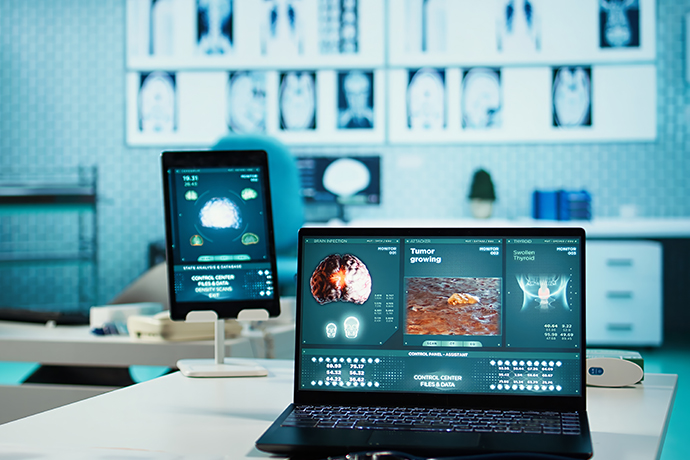 SPEAKERS
SPEAKERS
 TOPICS
TOPICS
Discover the benefits of new technology in the workplace and how it transforms the work environment. Uncover its advantages and impact on businesses today.

In a rapidly evolving world, technology is no longer just a tool; it is a catalyst for change, a beacon guiding us toward excellence. It reshapes industries, moves us beyond traditional boundaries, and empowers us to envision possibilities that were once considered out of reach.
Embrace the transformative power of new technology in work and employment. Witness how it drives innovation, reshapes processes, and redefines what’s possible in our professional landscapes. Let us explore the benefits of new technology in the workplace and the various ways it enhances our professional lives..

Technology speakers frequently underline that technology bridges the gap between people, enabling seamless communication. With tools like instant messaging and video conferencing, geographical boundaries are increasingly vanishing. We find ourselves in a world of perpetual connectedness, facilitating collaboration across vast distances with ease. This transformation not only improves efficiency but also fosters a sense of unity and teamwork.
The undeniable advantages of new technology in business are particularly evident when it comes to productivity. Automation and smart tools streamline tasks, allowing employees to focus on creative solutions. Time is our most precious resource, and technology grants us the power to utilise it more effectively. Harnessing innovations such as artificial intelligence and machine learning not only eases the workload but also enhances accuracy and efficiency.
Reducing costs without compromising quality remains a core objective for businesses seeking to achieve efficiency. By adeptly using new technology in business, companies are able to significantly cut down on overhead expenses. Innovations such as cloud computing eliminate the necessity for costly physical infrastructure, offering storage and computational power at a fraction of traditional costs. Similarly, the advent of remote work has diminished the requirement for expansive office spaces, which in turn translates to substantial savings on rent and utilities. This evolution not only reduces costs but also champions a careful balance between cost-effectiveness and innovation.
New technology fosters a progressive workplace culture, which is appealing to future-forward employees. They thrive in environments that emphasise technological advancement and dynamic growth. The integration of cutting-edge tools and platforms not only meets the expectations of digital-savvy professionals but also serves as a beacon for aspiring talents. In an age where skill sets rapidly evolve, organisations equipped with the latest technology effectively navigate these changes, retaining valuable employees who are eager to advance their skills.
The impact of technology on work and the workforce is profound, as it enables leaders to steer their ships with clarity and purpose. By leveraging advanced analytics and Big Data, businesses make informed decisions swiftly. These powerful tools collect and process vast amounts of data, transforming raw numbers into clear, manageable information that can be used to predict market trends, understand customer behaviours, and recognise emerging opportunities.
Flexibility isn’t a perk; it’s a necessity. The rise of remote work, catalysed by technology, offers employees the autonomy to balance their personal and professional lives. This has created a more fulfilled and productive workforce, demonstrating the benefits of technology in the workplace. Companies embracing remote work are witnessing a new paradigm where innovation thrives outside traditional office boundaries. Employees report higher job satisfaction as they enjoy the freedom to tailor their work environments, which in turn fosters creativity and independence. New technology work and employment practices not only enhance work-life balance but also contribute to greater organisational agility, essential for thriving in a competitive landscape.
Visionaries and thought leaders like Aric Dromi epitomise this spirit of innovation, encouraging others to break free from conventional constraints and embrace new possibilities with fervour. Their influence is profound, as they illuminate the path towards creative resolutions and cutting-edge concepts, inspiring the workforce to push the boundaries of what is achievable and reimagine the world of work through the lens of innovation.

One of the most overlooked benefits of new technology in the workplace is the sharpened sense of strategic awareness it encourages. As businesses integrate advanced tools, they must also remain alert to potential pitfalls—the disadvantages of new technology in business, such as cybersecurity threats, high implementation costs, or increased dependency on digital systems.
This growing awareness prompts smarter planning and more resilient decision-making. Thought leaders like Andrew Grill highlight the importance of digital intelligence and proactive leadership in ensuring technology remains a driving force—not a disruptive one. By developing a keen understanding of both the advantages and potential drawbacks of innovation, businesses position themselves to lead with foresight and confidence.
The push towards sustainability is real, and technology plays a crucial role. By implementing energy-efficient systems and intelligent resource management, businesses can effectively reduce their carbon footprint while maintaining operational excellence. This not only benefits the environment but also enhances brand image and societal impact. Moreover, green technologies such as renewable energy sources and eco-friendly materials minimise waste and encourage responsible consumption.
Employee welfare is paramount. Technologies that facilitate health monitoring and wellness programs contribute to a healthier, happier workforce. Increased access to online health services and stress management platforms helps employees maintain balance in their lives, boosting overall morale and productivity. A workplace culture rooted in well-being attracts and retains top talent, ensuring employees feel valued and supported. The future of work is compassionate and inclusive, championed by thought leaders like Bruce Daisley, who advocate for environments where individuals can thrive holistically.
Embracing technology is more than a trend; it’s a blueprint for future resilience. By staying ahead of technological advancements, companies secure their position in a rapidly changing marketplace. This foresight is crucial to navigating the ever-evolving landscape of work. Future-proofing involves anticipating changes and cultivating a culture that is adaptable and resilient. This involves investing in training and tools that enable quick adaptation to new technological demands.
Engage with voices like Amy Tez for a deeper understanding of the profound transformations shaping our work environment. Amy Tez provides insights into the evolving dynamics of the workplace and the skills needed to thrive in a tech-driven future. To know more about the future of work, delve into strategic insights from industry leaders who are paving the way for tomorrow’s workforce.